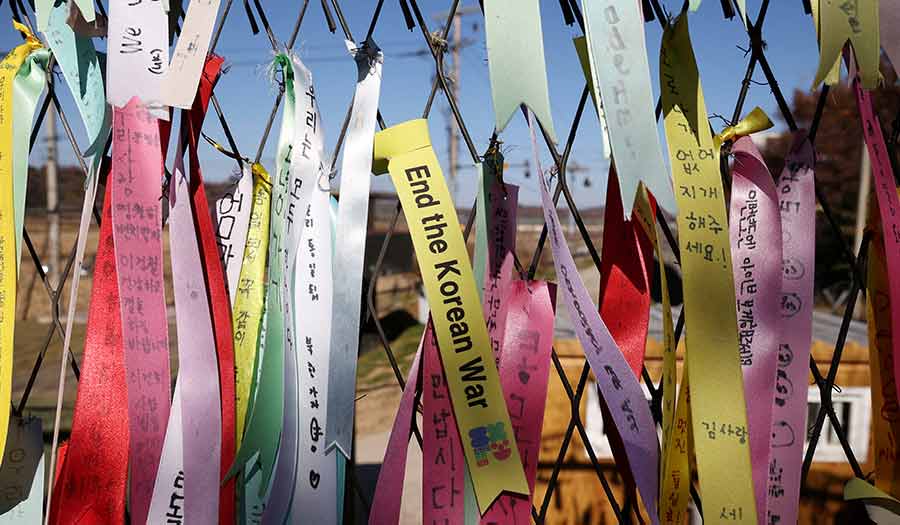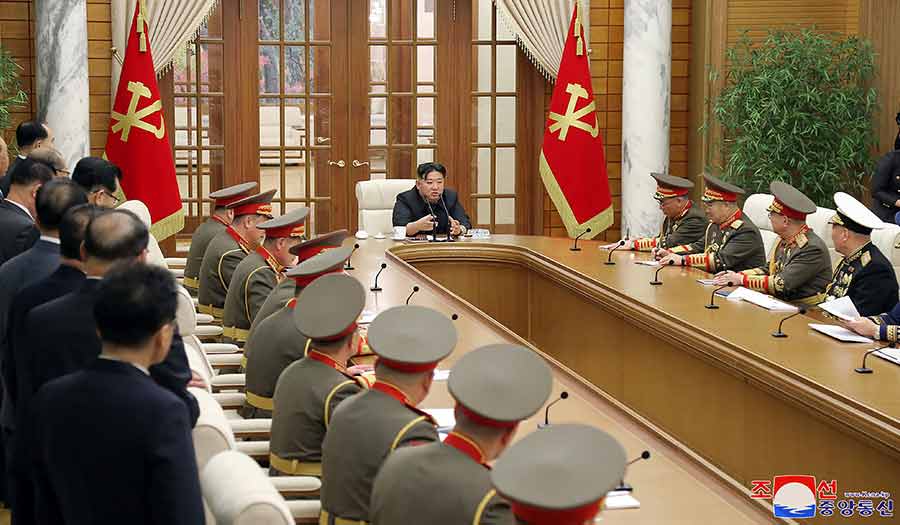 REUTERS/Kim Hong-Ji/File Photo
REUTERS/Kim Hong-Ji/File Photo
World News Desk
Learn the why behind the headlines.
Subscribe to the Real Truth for FREE news and analysis.
Subscribe NowSEOUL (Reuters) – North Korea is shaking up the way it handles relations with South Korea, enacting changes to policy and government organizations that would effectively treat the South as a separate, enemy state.
The moves, which break with decades of policy, could have North Korea’s foreign ministry taking over relations with the South, and potentially help justify the use of nuclear weapons against Seoul in a future war, analysts said.
Since the 1950-53 Korean War ended in a stalemate, both nations have had policies that treat each other differently than other countries.
That has included relying on special agencies and ministries for inter-Korean relations rather than their foreign ministries, and embracing policies for a future peaceful reunification, usually envisioning a single state with two systems.
But in recent remarks to a year-end party meeting, North Korean leader Kim Jong Un said peaceful reunification is impossible, and said the government would make a “decisive policy change” in relations with the “enemy.” He also ordered the military to be prepared to pacify and occupy the South in the event of a crisis.
The changes in policy could help North Korea justify using nuclear weapons against the South, as it has increasingly threatened in recent years, said Hong Min, a senior researcher at the Korea Institute for National Unification in Seoul.
“If they give up on peaceful unification and redefine South Korea as a hostile enemy country with no diplomatic relations, the contradiction of using nuclear weapons against the same people will be eliminated,” Mr. Hong said.
Reflecting Reality
Some observers say North Korea’s declarations simply reflect the reality of two countries with deep divisions and disparities.
“North Korea in recent years had suggested that it was moving toward a fundamental shift in South Korea policy, and the December 2023 Party plenum not only confirmed it, it also formalised it,” said Rachel Minyoung Lee, of the U.S.-based Stimson Center.
The extent of the organizational changes is unclear, and some analysts said that because such rhetoric is more closely reflecting the status quo, there is unlikely to be a major shift in the already antagonistic relationship between the two Koreas.
Previous periods of high tensions, for example during the “fire and fury” of 2016 and 2017, have also occasionally been followed by periods of detent and diplomacy, including during the 2018 and 2019 summits between Mr. Kim and the presidents of South Korea and the United States.
“North Korea in its report on the result of the party plenary meeting said it would not consider us as a counterpart for reconciliation and unification but the truth is that it has never sincerely pushed for them,” an official with the South’s unification ministry, which handles relations with the North, said in a statement on Wednesday.
Foreign Minister
The United Front Department of the Workers’ Party of Korea has traditionally been tasked with relations with the South, including intelligence gathering and propaganda efforts.
But even if talks do someday resume, the announcement likely means that Foreign Minister Choe Son Hui, a seasoned diplomat, will be the one overseeing relations with the South, said Michael Madden, a North Korea leadership expert with the Stimson Center.
“I would trace her role as a substantive adviser on unification and South Korea policy to Kim’s 2019 visit to the former inter-Korea resort near Mt. Kumgang. Her attendance at that event was not unprecedented but it was most unusual and portended her writ expanding to South Korean policy,” Mr. Madden said.
The fact that Ms. Choe, a career diplomat who has played little role in inter-Korean affairs, led the task of “dismantling and reforming” entities linked to South Korea, as reported by state media, could mean the foreign ministry will absorb those organizations and their functions, said Yang Moo-jin, president of the University of North Korean Studies in Seoul.
“The United Front Department and the Committee for the Peaceful Reunification of the Fatherland, which had traditionally handled inter-Korean ties, could be disbanded altogether or at least see their roles significantly reduce,” he said. North Korea could also decide to cut the South out entirely and only deal with the United States, he added.
While foreign ministry officials occasionally advised on inter-Korean issues, under Mr. Kim there has been no known crossover between foreign ministry and UFD officials, Mr. Madden said.
Whatever changes occur, key UFD intelligence official are unlikely to be sidelined and the agency is likely to retain authority over some key propaganda broadcasts and websites, he added.
- World News Desk
- GEOPOLITICS
 North Korea’s Kim Says Military Should ‘Thoroughly Annihilate’ U.S., South Korea if Provoked
North Korea’s Kim Says Military Should ‘Thoroughly Annihilate’ U.S., South Korea if Provoked
More on Related Topics:
- The Last U.S.-Russian Nuclear Pact Is About to Expire, Ending a Half-Century of Arms Control
- Explainer: What Is President Trump’s ‘Board of Peace’ and Who Has Joined So Far?
- China and Japan, Uneasy Neighbors in East Asia, Are at Odds Again
- Is Peace in Ukraine Any Closer After Trump-Zelenskyy Talks?
- Explainer: Why Is Fate of Donetsk Region a Sticking Point in Talks on Ending War in Ukraine?


